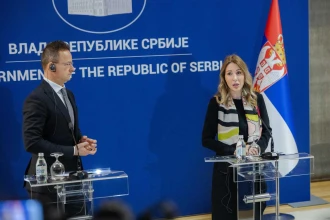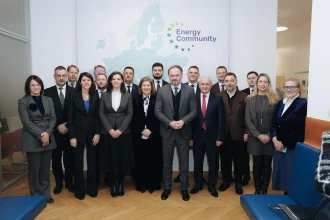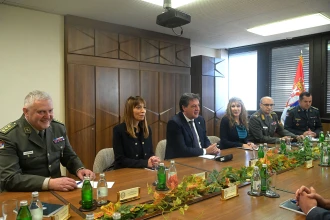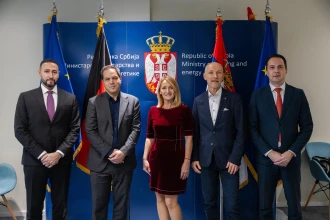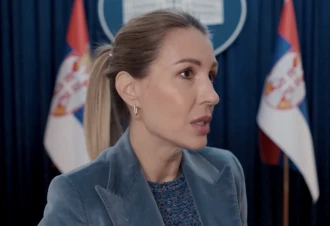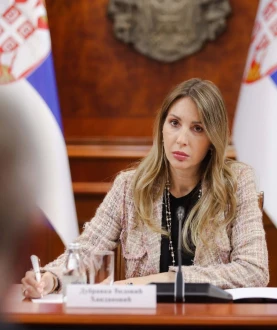Minister of Mining and Energy, Dubravka Djedović Handanović, signed an agreement today that that finalizes the financing of the project for the construction of the 66 MW Kostolac wind farm, which is funded through a loan from the German KfW Bank, the European Union and EPS funds.
Djedović Handanović: Thanks to the EU, the Kostolac wind farm has secured a grant of EUR 30 million, and it will start producing green energy for approximately 30,000 households in Serbia next year
"The agreement we signed today, securing a grant of EUR 30 million, represents a crucial step in realizing the construction project of the first EPS wind farm, the Kostolac wind farm, thereby finalizing the financial structure for the EUR 144 million project. This power plant, consisting of 20 wind turbines, will produce enough energy to supply around 30,000 households with green energy. The Wind farm will be situated on the sites of exhausted surface mines and landfills of thermal power plants and Kostolac mines," she explained.
Recalling that the construction of the Kostolac B3 thermal power plant will be completed in a few months, the Minister emphasized that the next crucial step is investing in RES, an area where EPS has not invested enough in previous years, specifically in wind and solar energy. "We expect the Kostolac wind farm to be connected to the grid and start supplying green energy to our citizens in the first half of 2025. Simultaneously, the EPS solar power plant Petka with a capacity of 9.75 MW is planned for completion during the same period. All three new power plants in Kostolac - TPP Kostolac B3, Wind Farm Kostolac, and SPP Petka are part of the significant investments in the energy system that we plan in the coming years, and they are expected to be completed in the period before EXPO 2027."
She reminded that a strategic partner for 1 GW of self-balancing solar power plants, combined with batteries, was chosen through a public call in October 2023. This project will be implemented by a consortium led by the South Korean company Huyndai Engineering and will be owned by EPS, i.e. the state, upon completion. "With new investments in RES, it is especially important that we have the possibility to use the produced energy primarily for the domestic market." Thus, having more green energy in our energy system will mean not only a healthier environment but also greater energy security and independence of Serbia, which is our strategic goal," said Djedović Handanović.
The Minister pointed out that the European Union and the Federal Republic of Germany are key partners for Serbia in the energy transition. "Serbia and Germany have established a climate partnership to support our country in implementing the EU's Green Agenda. We have a successful collaboration with Germany, primarily in the district heating sector, the introduction of RES, and the development of the transmission network, which has invested 1.5 billion euros in the energy sector since 2000. With the financial support of the EU, we are realizing some of the most important projects in the energy sector, such as the gas interconnection with Bulgaria and the Trans-Balkan Corridor. We are particularly grateful for the 165 million euros grant received last year, primarily for assisting energy vulnerable consumers and investing in the distribution network," said Djedović Handanović.
Minister for European Integration, Tanja Miščević, said that the construction of the Kostolac wind farm represents a confirmation of the partnership between Serbia, the European Union and the Federal Republic of Germany in the process of energy diversification and the transition to green energy. "Approximately 30,000 households will benefit directly from this wind farm, not only through the production of electricity, but also through environmental protection and a reduction in the use of fossil fuels." The project will also have an impact on new employment in Kostolac and its surroundings in order to promote the use of RES", said the Minister. She added that Serbia has good projects that help assert the country in order to receive significant funds and grants from the EU.
EU Ambassador to Serbia, Emanuele Giaufret, emphasized that the EU provides strong support to Serbia in the energy transition process.
"This project not only serves as evidence of Serbia's commitment to green energy but also stands as a cornerstone of our European Green Deal and Just Transition, promoting economic development while protecting our planet and citizens." The Kostolac wind farm represents our collective effort to move away from coal. It symbolizes our commitment to reducing reliance on fossil fuels, decarbonizing our economies and embracing renewable energy sources. This project is only one element of our broader support to Serbia in the energy sector, amounting to over 500 million euros. We have covered the electricity bills of vulnerable households and businesses, modernized the power system of the MMA hospital, and constructed a new energy highway —bringing greener and safer energy to Serbia, the Trans-Balkan Electric Corridor. Therefore, the EU remains Serbia's most important partner in the field of energy," he concluded.
The Ambassador of the Federal Republic of Germany in Belgrade, Anke Konrad, said that Germany is a reliable partner in the field of energy transition and that through the regional climate partnership, Germany consistently focuses on supporting the promoting of green energy in Serbia, as well as on energy connectivity in Europe. "We are intensively investing, for example, in the energy rehabilitation of buildings in the public sector, such as the MMA, or in the Trans-Balkan Corridor. This corridor will not only connect the Western Balkans with the EU but also increase the capacity of the network. Additionally, we invest in the decarbonization of heating plants through the use of biomass such as wood chips or solar energy. Alongside infrastructure projects, in cooperation with the EBRD, we provide a loan to EPS and credit lines for commercial banks intended for small and medium-sized ecological enterprises, as well as green investments," said Konrad.
She emphasized that the wind farm in Kostolac is a turning point because it will increase the share of RES in energy production in Serbia. Its annual production of 187 gigawatt-hours will replace about 95,000 tons of coal that would be needed to produce the same amount of electricity.
The construction project of the Kostolac wind farm is financed by an EUR 80 million loan from the German development bank KfW, a grant of EUR 1.8 million, and a EUR 30 million grant from the European Union through the Investment Framework for the Western Balkans (WBIF), while EPS has provided 32.2 million euros.


.jpeg)
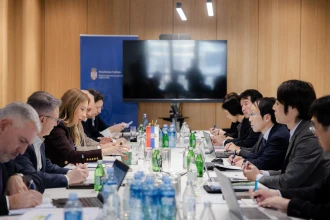
.webp)
